Ken Russell’s two 1978 TV films on the Lake District poets William Wordsworth and Samuel Taylor Coleridge, Clouds of Glory: William and Dorothy and Clouds of Glory: Rime of the Ancient Mariner, have become—apparently due to music rights—almost impossible to see. The tragedy of this is that the two films—which do intersect—are among the finest works in Russell’s career, especially Rime of the Ancient Mariner. The films were made quickly and cheaply for Granada Television—and were frankly the only thing in the offing for Russell after the box-office failure of Valentino (1977). You’d never know it from the resulting films—except perhaps for the heavy reliance on shooting in natural light, which actually suits the tone.

Originally planned as three films—the third, King of the Crocodiles, about the minor Lake poet Robert Southey, was never made—Clouds of Glory, as it stands, provides two perfectly complementary and contrasting works. Either film works alone, but they work better together. They reflect two very different—yet not unrelated—sides of both the key Lake poets and of Russell’s own love affair with the Lake District. That particular area of England was something the filmmaker discovered in 1967 while making Dante’s Inferno, and it quickly became to Russell as Monument Valley became to John Ford. The area crops up in one form or another in films as diverse as Dance of the Seven Veils (1970), The Devils (1971), Mahler (1974), Tommy (1975) and The Rainbow (1989). Clouds often recalls the earlier films—and indeed copies (to quite a different end) the penultimate shot from Tommy in The Rime of the Ancient Mariner.
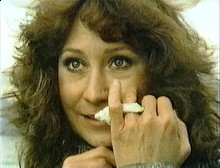
The films were written in collaboration with Russell’s old BBC friend Melvyn Bragg, who’d also written The Music Lovers (1970). Not surprisingly—in light of the sensibilities of both men—Bragg’s contribution was greater on the more pastoral William and Dorothy, or to give it its full title, William and Dorothy: The Love Story of the Poet Wordsworth and His Sister. That full title is not a come-on, because that is exactly what the film is. It is not, however, in any way salacious, but it does directly address the concept of Wordsworth’s (David Warner) sister (Felicity Kendal) as both the poet’s muse and his natural wife. There is even a scene that depicts a kind of marriage in nature.
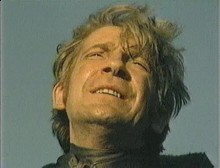
It’s a gentle film that is bound together by their relationship, Wordsworth’s poetry, the image of the Lake District and a rich musical tapestry drawn from the works of Frank Bridge, John Ireland and George Butterworth. Built around a framing story involving the older Wordsworths, William’s fears that Dorothy is dying and a chance encounter with a fictional visiting American, Reverend Dewey (William Hootkins), the film is told largely in flashbacks that recount the lives of the pair. The approach works with quiet intensity—thanks in no small part to the performances of the three main characters and David Warner’s ability to recite Wordsworth’s poems with the conviction of an artist who is carried away by his own emotionalism. When this is combined with Russell’s visual patterning and the beautiful images he and his most frequent cinematographer, Dick Bush, conjure up, the results are far more stunning in cumulative impact than a simple reading might suggest.
In some ways, William and Dorothy suffers a bit when placed alongside the cinematic fireworks of The Rime of the Ancient Mariner: The Strange Story of Samuel Coleridge, Poet and Drug Addict. But frankly, most films would—and part of the reason Rime works so well is due to its juxtaposition to the quieter first film.
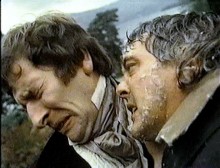
There is nothing quiet about Rime, which bursts onto the screen with a ferocity that is perfectly matched by an excerpt from Ralph Vaughan Williams’ Fourth Symphony. The film opens with the laudanum-addicted Coleridge (David Hemmings in the performance of his career) ransacking his library in search of the drug. It’s completely no-holds barred filmmaking that leads—very naturally—into telling Coleridge’s story in terms of his most famous poem. (The more you know the poem, “The Rime of the Ancient Mariner,” the richer the film is.) The first seven minutes of Rime may possibly be the most compelling, hallucinatory—and yet dramatically viable—sequence in Russell’s career. And it doesn’t stop there, though the film does then adopt somewhat of a calmer approach. “Somewhat” is the operative word.
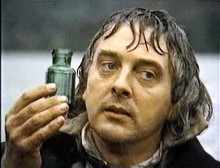
While Rime never reaches—nor does it intend to—the utter fantastication of such Russell biographical films as Dance of the Seven Veils or Lisztomania (1975), it is, in some respects, an even more daring approach to the biographical film. The choice of presenting Coleridge’s life through the poem—presenting his wife (Kika Markham) as the albatross the Ancient Mariner (Coleridge) kills and representing various scenes (real and drug-induced) in imagery drawn from the poem—was certainly bold. It was a boldness, however, that allowed for a psychological evaluation of man and artist unlike any other. It’s life imitating art, art imitating life and the two colliding into a truth that is stronger than either aspect alone.
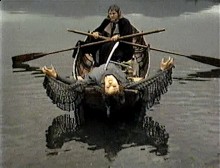
Brilliant as this is, it came with a heavy price attached to it. The two films were intended to be seen in the U.S. on Masterpiece Theatre—and that might easily have happened. William and Dorothy made it through without a hitch, but no sooner did Masterpiece Theatre‘s Alistair Cooke hit the scene where Coleridge buries an anchor into his wife’s chest than the deal was off. And so the films found themselves without a U.S.buyer for about five years, at which time the fledgling—and now long-defunct—CBS Cable network opted to run them. It was something, but then CBS Cable was offered on very few services and almost no one ever saw Clouds of Glory stateside. After those few airings, it simply disappeared. As near as I can tell, the very few copies floating around today—including those being shown—are from that 1983 cablecast, and the films remain almost completely unknown.
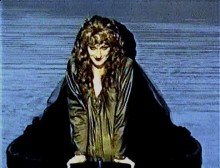
Rime, in particular, bristles with indelible images and a musical track—mostly drawn from the works of Ralph Vaughan Williams, with a bit of Benjamin Britten mixed in—that is the most accomplished in any Russell film. And that again poses a major problem for the films getting a proper release on DVD, since copyright issues make it a difficult and expensive proposition. This is a situation we’ve already seen on Russell’s four-part TV film of Lady Chatterley (1993), which was released in the UK on VHS with its sound track intact, but hit these shores on DVD with generic—and not especially effective—music replacing the classical recordings Russell intended. While that approach provided some solution there, it would be unthinkable in the case of these films, so I am not holding my breath for a second life for Clouds of Glory. See them now while you can.


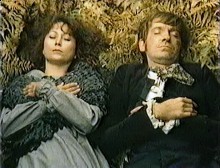
David Warner’s ability to recite Wordsworth’s poems with the conviction of an artist who is carried away by his own emotionalism.
I’ve often fantasized about a movie where David Warner and Ian McKellen stand talking at each other for 90 minutes, with occasional interjections from Tom Waits.
I’ve often fantasized about a movie where David Warner and Ian McKellen stand talking at each other for 90 minutes, with occasional interjections from Tom Waits.
Well, this would give you part of that, I guess — and the bonus of William Hootkins reciting (yelling really) Wordsworth, too.
to Ken Hanke,
As a local college teacher, I’ve been planning a film course for some time in the next year. It would consist of some six writer-bio-pics, including only those whose native language was/is English. Right now I have or will soon acquire copies of about five films. These two Ken Russell films, the two-part Clouds of Glory, might be suitable if I could acquire a copy of of it/them or learn how to borrow or even simply find a copy.
I would appreciate hearing any suggestions you might have. Thanks
These two Ken Russell films, the two-part Clouds of Glory, might be suitable if I could acquire a copy of of it/them or learn how to borrow or even simply find a copy.
I think something can be arranged. E-mail me at XpressMovies@aol.com
hello! i guess this is a site based in the usa? i live in a small village in the united kingdom called nether stowey, in somerset. coleridge fans should be familiar with it! it is where coleridge and wordsworth wrote the lyrical ballads. indeed, i work at coleridges cottage. i have been trying to track this film down for years as its should at least be available to the “friends of coleridge” based here in the uk but amazingly it isnt! is there a possibility the copyright issue might be solved by it being posted on youtube? or perhaps replacing the music with a recently released ballet by richard hill called “images of kubla khan”? it sounds like rimsky korsakov and is narrated by ben kingsley. i hope to one day see this film!